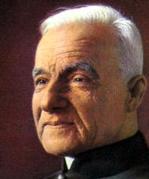Catechism of the Catholic Church
238 Many religions invoke God as "Father". The deity is often considered the "father of gods and of men". In Israel, God is called "Father" inasmuch as he is Creator of the world. 59 Even more, God is Father because of the covenant and the gift of the law to Israel, "his first-born son". 60 God is also called the Father of the king of Israel. Most especially he is "the Father of the poor", of the orphaned and the widowed, who are under his loving protection. 61
239 By calling God "Father", the language of faith indicates two main things: that God is the first origin of everything and transcendent authority; and that he is at the same time goodness and loving care for all his children. God's parental tenderness can also be expressed by the image of motherhood, 62 which emphasizes God's immanence, the intimacy between Creator and creature. The language of faith thus draws on the human experience of parents, who are in a way the first representatives of God for man. But this experience also tells us that human parents are fallible and can disfigure the face of fatherhood and motherhood. We ought therefore to recall that God transcends the human distinction between the sexes. He is neither man nor woman: he is God. He also transcends human fatherhood and motherhood, although he is their origin and standard: 63 no one is father as God is Father.
240 Jesus revealed that God is Father in an unheard-of sense: he is Father not only in being Creator; he is eternally Father in relation to his only Son, who is eternally Son only in relation to his Father: "No one knows the Son except the Father, and no one knows the Father except the Son and any one to whom the Son chooses to reveal him." 64
241 For this reason the apostles confess Jesus to be the Word: "In the beginning was the Word, and the Word was with God, and the Word was God"; as "the image of the invisible God"; as the "radiance of the glory of God and the very stamp of his nature". 65
242 Following this apostolic tradition, the Church confessed at the first ecumenical council at Nicaea (325) that the Son is "consubstantial" with the Father, that is, one only God with him. 66 The second ecumenical council, held at Constantinople in 381, kept this expression in its formulation of the Nicene Creed and confessed "the only- begotten Son of God, eternally begotten of the Father, light from light, true God from true God, begotten not made, consubstantial with the Father". 67
Notes:
English Translation of the Cathechism of the Catholic Church for the United States of America © 1997, United States Catholic Conference, Inc.






